Williamsburg Restaurant Shalom Japan Fuses New Traditions
With a new cookbook and celebrating more than 10 years in business, the couple behind the restaurant explain its genesis.

Aaron Israel and Sawako Okochi and their family at a local farmer’s market. Photo by Yuki Sugiura
Sawako Okochi and Aaron Israel fell in love over food. For the two chefs set up on a date at a Chinese restaurant, food became a way to get to know each other and learn about each other’s backgrounds. Okochi, who came to the United States from Japan for school, and Israel, who grew up in a Jewish American family on Long Island, shared their cultures through late-night home-cooked meals on Okochi’s Crown Heights fire escape.
After a trip to Japan, the pair decided to return to Brooklyn and open their own restaurant together, sharing from a street corner in Williamsburg their melding of Japanese and Jewish cuisines from the playfully named Shalom Japan. Ten years later, the couple have released their first cookbook, “Love Japan,” an ode to the cooking they do in their kitchen for themselves and their two young children.
Shalom Japan just celebrated its 10th anniversary. Congratulations on that. Why did you open the restaurant and how does it feel to cross this milestone in Williamsburg?
Israel: We had just moved in together and I was working on opening a restaurant, then I went to Japan with her for the first time and while we were in Japan there was a big fire in our building. We’re like halfway through this trip in Japan together, we’d just moved in together and we had nowhere to go back to, so we were like what are we gonna do? We were kind of like, alright, well, you know, when we get back we’re going to be starting over, why not just do the restaurant together. It’s a lot of hard work, obviously, opening a restaurant, you want to work with people who you trust, and, I was like well I trust you more than anybody else. We had joked a couple of years earlier about if we ever opened a restaurant that we would call it Shalom Japan, because we had found this guidebook in the Brooklyn Library that had been written in ’83 about Jewish food on the Lower East Side and it had a restaurant called Shalom Japan and we were like oh my god this is hilarious. It was a joke between us that if we ever open a restaurant we’ll call it Shalom Japan, and then we were like well maybe we should open a restaurant together and maybe we should just call it Shalom Japan. Though, of course, it wasn’t as simple as that – Sawa is laughing because it wasn’t as simple as that.
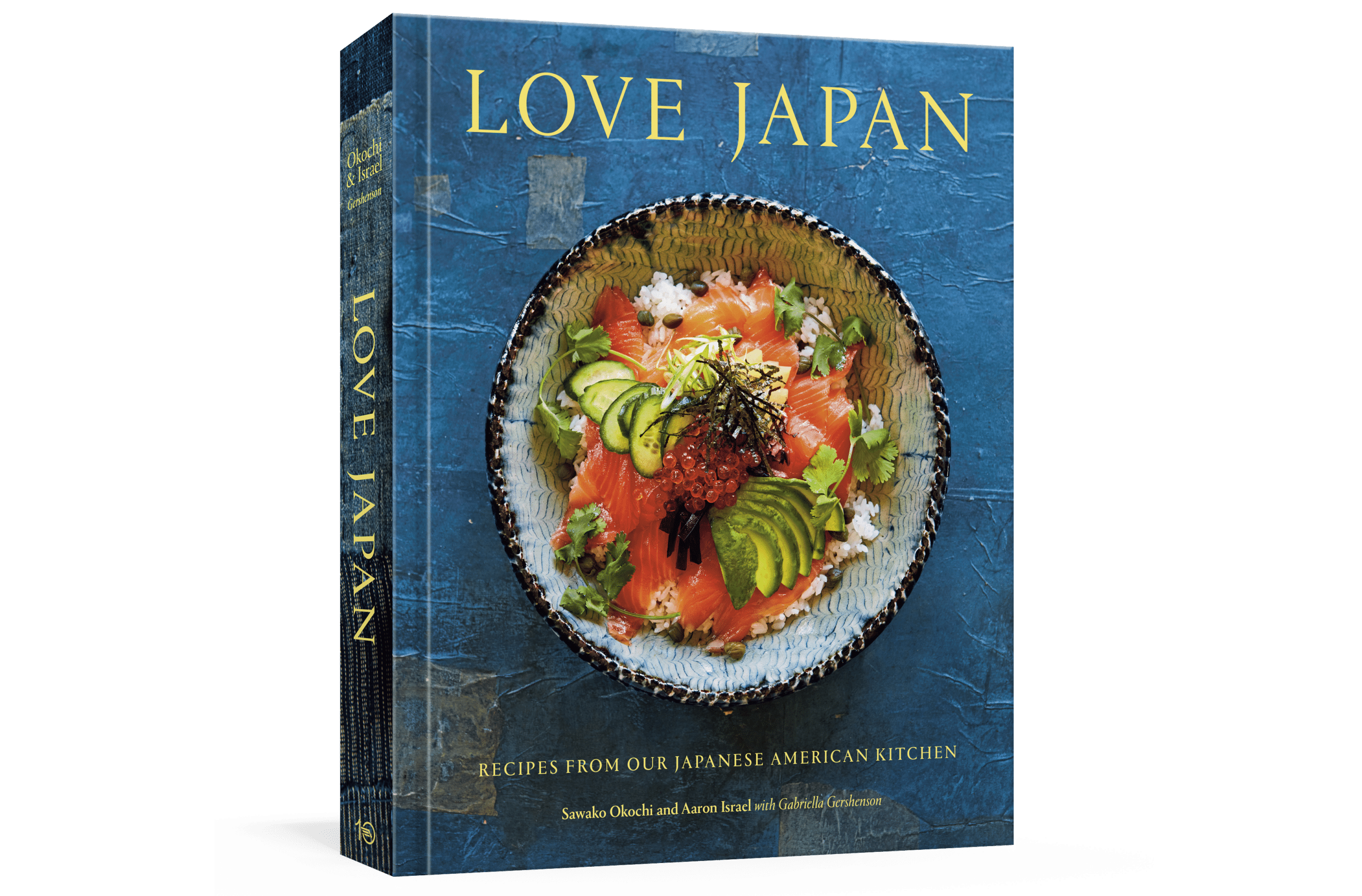
What was the inspiration for some of the dishes?
Okochi: We naturally cook for each other because we’re chefs and we go out together a lot. Whenever we get something that we’re like, oh, this is really good, we want to create our own with it. That’s how we started cooking, we started fusing our own food. The lox bowl, I think that was the first thing we cooked together that is fusing the two cuisines together. We went to a Japanese restaurant, and it was like a kaiseki kind of place, and the last course was salmon rice. We didn’t quite love it, so we created our own version of it. I made the sushi rice and I got a lox from a Jewish appetizing store and we added some pickles and some capers, and we were like, oh, this is actually really delicious. Aaron was kind of skeptical because lox doesn’t go with rice.
Israel: Lox goes on bagels.
Okochi: But I was like, this is going to be really good on rice, trust me.
Israel: A lot of the food that we cook together is about teaching each other about each other’s cultures. So Sawa was like, well, we eat smoked salmon on top of rice all the time. That’s sort of the eye-opening thing for us, how are we going to teach each other through food about who we are.
How did you find the community initially responded to the fusion of Japanese and Jewish food, and has that changed over time?
Okochi: A lot of people come in with, I guess sort of like curiosity and suspicion, what is it going to be? But you know, a lot of people are pleasantly surprised that oh, this is actually good. People do come back for a bowl of ramen or a lox bowl. We’ve been open for almost 11 years so I guess that proves it.
Israel: My favorite is when people come in and they’re like one of my parents is Jewish, one of my parents is Japanese, this restaurant was made for me. We get that a lot.
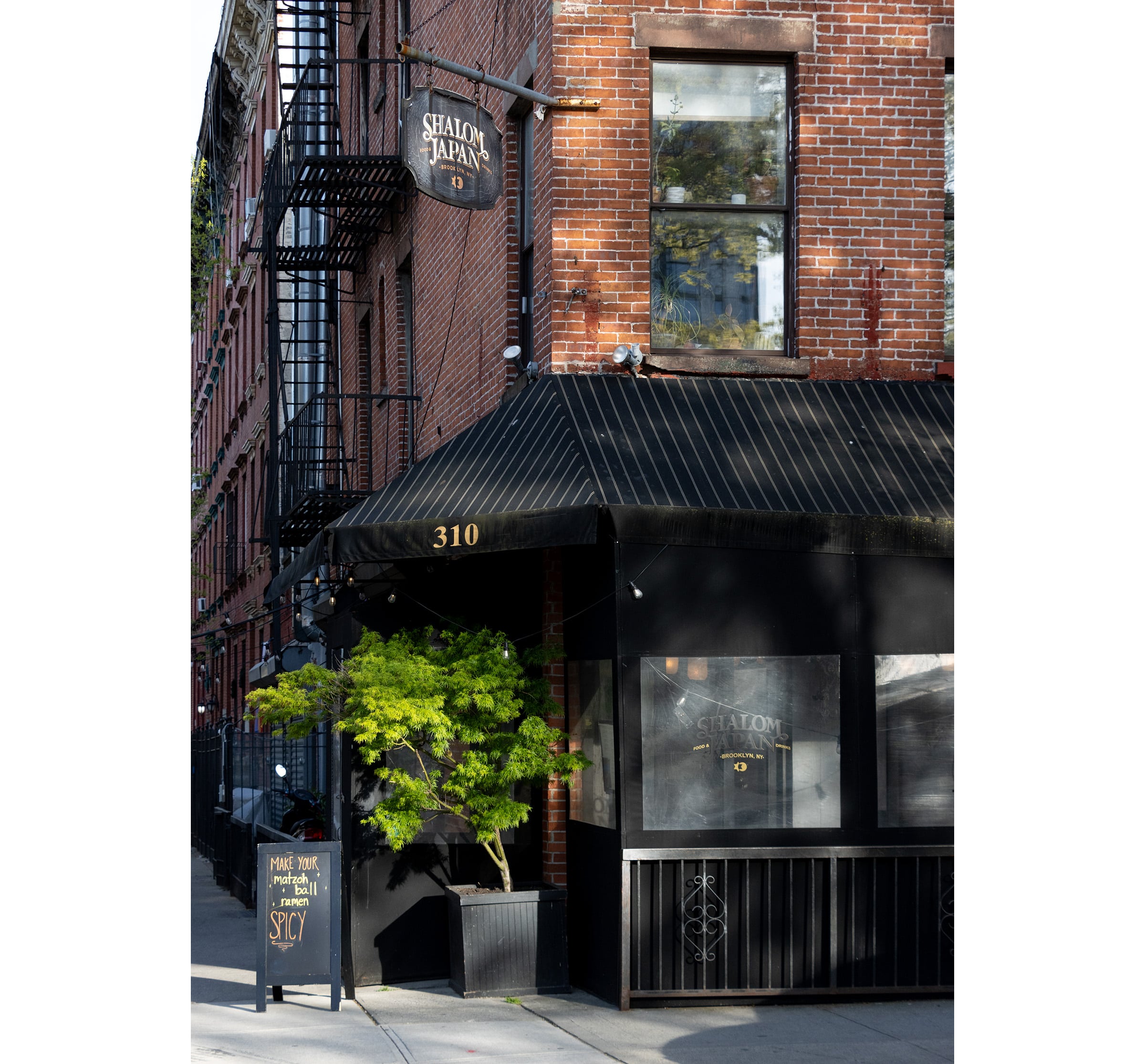
Was there anything like what you’re doing already offered in Brooklyn before you opened?
Israel: Jewish and Japanese? No. One thing that we’ve seen since we opened is definitely a lot of people are more willing to embrace who they are as chefs, whether it’s from whatever region of some country that they’re from, or I’m half this and half this and I grew up eating French inspired Chinese food. I think more people are willing to embrace their own multiculturalism through their food. I wouldn’t say that that’s because of us. But I would say that since we’ve opened we see a lot more of that.
Can you tell me why you chose this location and Brooklyn for the restaurant?
Okochi: I’ve been living in Brooklyn my entire New York City life. I just love Brooklyn. I don’t have a desire to go – I mean, I worked in Manhattan a bunch, but if I wanted to open my own, I wanted to do it in Brooklyn. It’s my second home.
Israel: The actual location, we found it, or it found us. We had just moved back into the city after the fire, and we worked with some brokers looking for some spaces. We had looked in Carroll Gardens and some spots in Prospect Heights. I had lived in Brooklyn for a pretty long time, but it was more [southern] Brooklyn. And we lived in Crown Heights together so we were looking around there a little bit, we didn’t really spend much time necessarily in Williamsburg. But we wanted to get a little momentum going, we were like let’s do a pop-up dinner. So I found an ad on Craigslist for somebody who was basically willing to rent out their restaurant space. I rode my bike past it and I was like that’s a cute little spot. And then I called the guy and he’s like you know I’m actually looking to offload my lease. He told me more of the details. The space felt right to us, it’s kind of tucked away, but also hidden in plain sight.
Does Brooklyn inspire your cooking? Does the culture influence what you do at the restaurant and even what you do in your home lives cooking-wise?
Okochi: Brooklyn has a lot of restaurants. You know, I’m Japanese and I look for Japanese groceries. There are a lot actually popping up, a few Japanese grocery stores in Brooklyn, and Williamsburg, you know Brooklyn has such a diverse food culture. And there’s so much local stuff around, we go to the markets every Saturday to get our groceries. We like the sake that’s brewed here. There’s so much that we can get in Brooklyn, it’s all so inspiring.
I read in the book early on that you were getting your family to send you over a lot of ingredients early in your journey into cooking. Do you find that you can get most things here now?
Oh, yeah.
Did you want to add anything about Brooklyn?
Israel: I’ve lived in Brooklyn for 20 years and I think Sawa longer. It’s a wonderful borough. Whenever we go into Manhattan, which I also love doing, we get back to Brooklyn and it always feels nice, like we’re home. There’s so much stuff, but it also still feels so neighborhoody, and that’s great, it’s just the right amount of crowdedness for us.
Did you decide to pull it together and release it for the 10th anniversary of the restaurant or was that just a coincidence?
Israel: Coincidence, good timing. We’d been working on it for a long time, but the publisher sets the release date and the deadlines and that kind of stuff. So it kind of worked out that way but it was a nice thing to do, you know, in line with being open for 10 years. It was a lot of work, but restaurants are really fleeting. They come and they go, but a book is something that is a little more frozen in time and it doesn’t go anywhere, you know, and is a testament to who we are at this point.
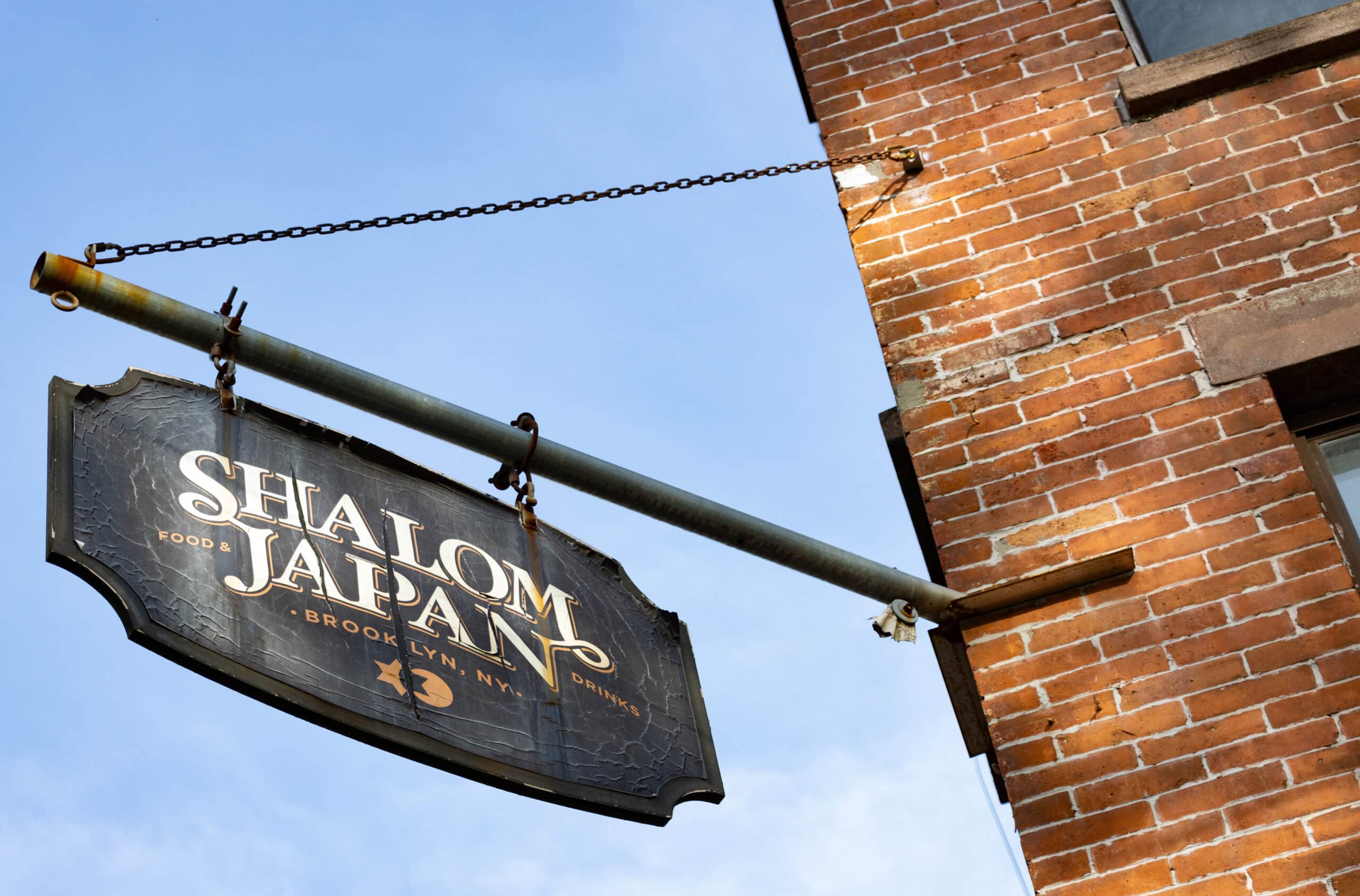
What are a couple of kitchen essentials that a new Brooklyn home chef should have on hand to explore the cuisine, what would a few items be that you would recommend?
Israel: I definitely think cooking chopsticks are great. They’re really perfect for cooking Japanese food. A rice cooker, but that’s definitely an investment, cooking chopsticks are pretty cheap. And they don’t take up much space. For us, we use our rice cooker multiple times a week, almost every day sometimes, so you know for us that’s really good and really convenient, but you don’t need it to do the recipes. You can just cook rice on the stove and it comes out great. A Japanese hotpot is really good. A butane burner. We use ours all the time making hotpot at the table and it’s such a great way to share a meal with people. You get to chat and cook. Everybody gets to put what they want in the pot.
How do you encourage, and what advice would you have for other parents, in terms of getting your children to eat a range of different foods?
Israel: When we cook at home for the kids we always make at least one thing that we know they’re going to eat and we don’t really force them to eat the other stuff most of the time. Then they kind of come around.
What do you hope readers will take from the book?
Israel: I hope that people learn that Japanese food is definitely accessible and it’s really elegant, but it also can be really simple to make. And it’s more than just sushi and ramen. There’s so much and a lot of it is simple home cooking, soulful and satisfying, but not necessarily super complicated. And I hope people can explore and learn about Japanese home cooking and then also, too, our story and some of our quirkiness. There’s nothing traditional about matzo ball ramen, but it sort of takes something that’s traditional and puts a spin on it. I hope people see that Japanese home cooking is really doable, and it’s really awesome.
Editor’s note: A version of this story appeared in the Spring/Summer 2024 issue of Brownstoner magazine.
Related Stories
- Food for Friends: Win Son’s Founders Dish on the Importance of Chasing Your Dreams
- Prospect Heights Food Writer Melissa Clark Explains How One-Pot Meals Are Like Haiku
- Duo Behind Bushwick’s Astrology-Themed Bar Mood Ring Serve Up Tips, Stories, Recipes
Email tips@brownstoner.com with further comments, questions or tips. Follow Brownstoner on X and Instagram, and like us on Facebook.



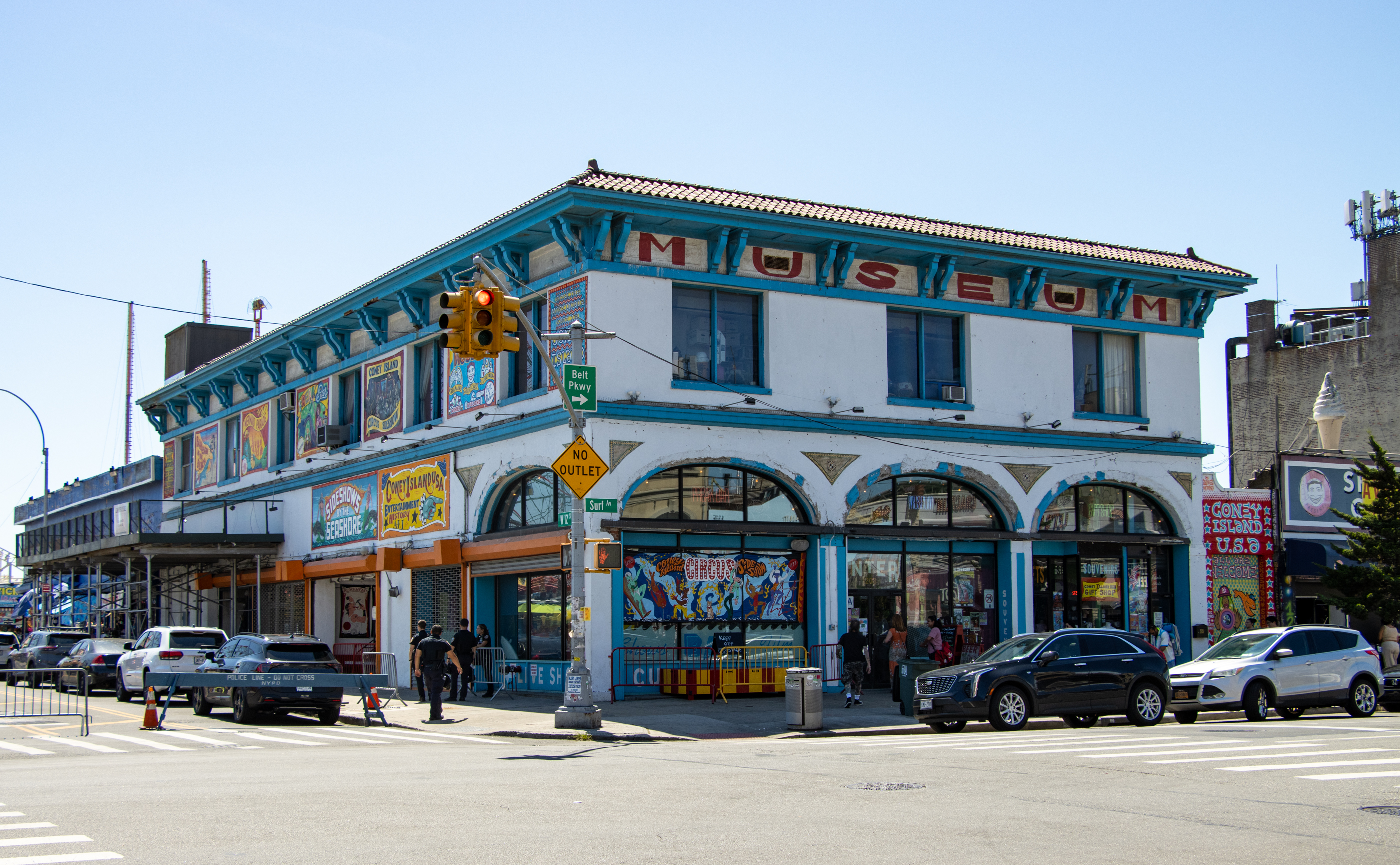
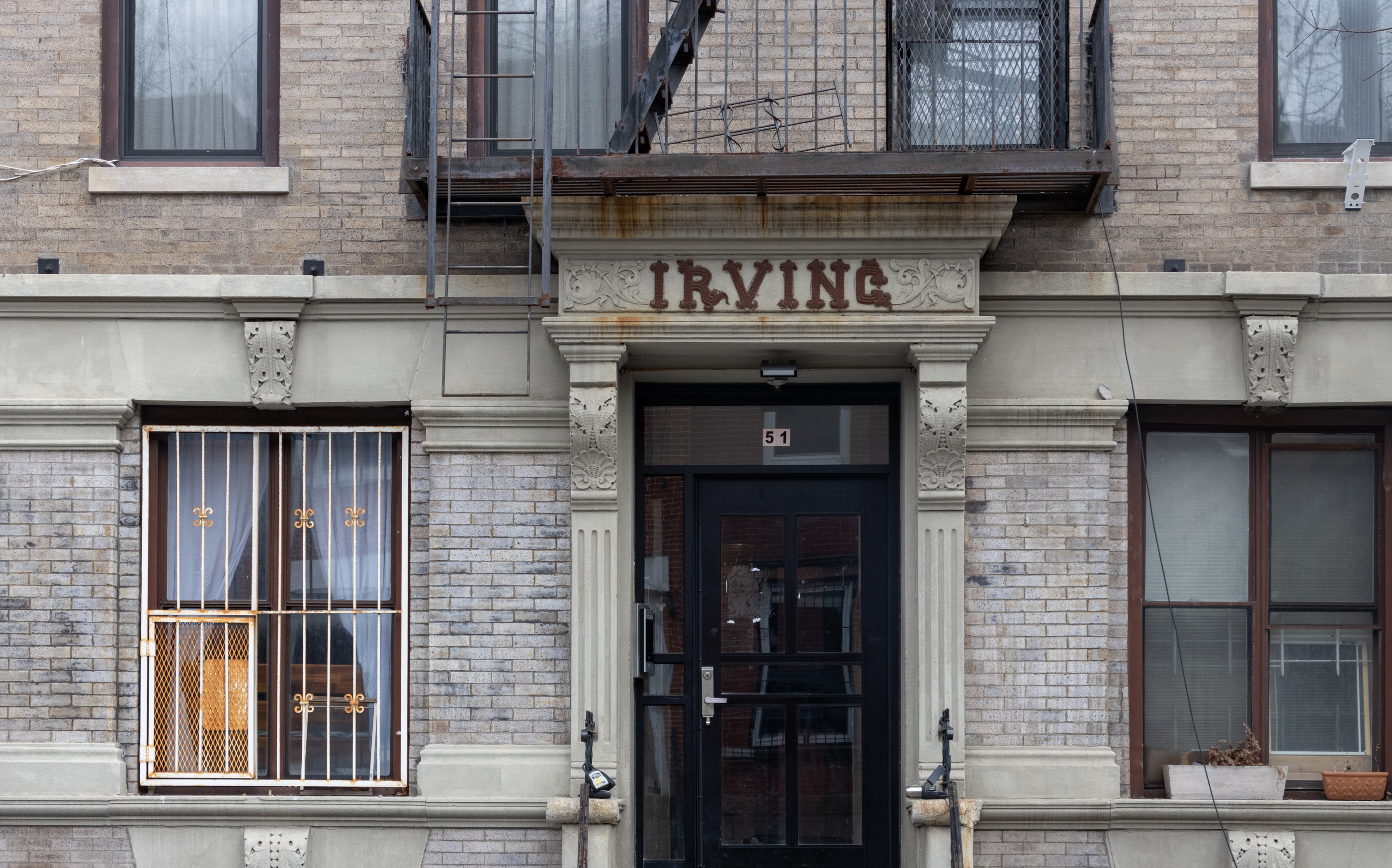
What's Your Take? Leave a Comment